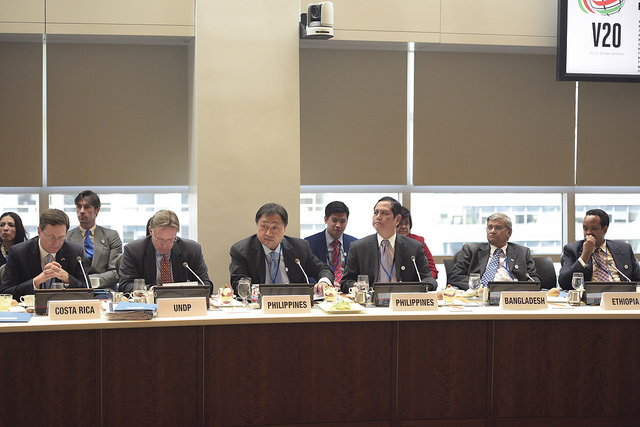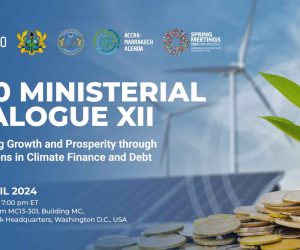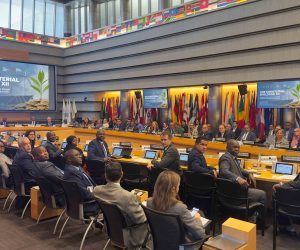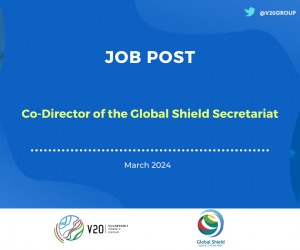V20 Chair’s Opening Statement at the V20 2nd Ministerial Dialogue

Photo caption: H.E. Mr. Cesar Purisima, Hon. Secretary of Finance of the Philippines delivering the Philippines CVF Chair opening statement at the V20 2nd Ministerial Dialogue at the 2016 Spring Meetings of the International Monetary Fund and the World Bank Group, Board Room, World Bank Main Complex, Washington DC (14 April 2016); Source: CVF/UNDP; Licence: CC
Opening Statement of the V20 Chair at the V20 2nd Ministerial Dialogue
H.E. Mr. Cesar Purisima, Hon. Secretary of Finance of the Philippines (V20 Chair)
Second Ministerial Dialogue Vulnerable Twenty (V20) Group at the 2016 Spring Meetings of the IMF and World Bank Group
14 April 2016, 12:15 pm –2 pm Washington, DC, USA
Excellencies, Partners, Colleagues, Ladies and Gentlemen, good afternoon!
Last year was a landmark year for our planet and people. Four documents were adopted internationally, identifying plans of action and setting commitments to address complex issues on development. The Addis Ababa Action Agenda Document under the Financing for Development and the 2030 Sustainable Development Agenda set targets and courses for action to achieve sustainable development over a 15-year period. The Sendai Framework 2015-2030 renewed our efforts on disaster risk reduction and resiliency. And before the year has ended, the world witnessed the historic adoption of the Paris Agreement under the United Nations Framework Convention on Climate Change (UNFCCC).
Thus, the launch of the Vulnerable 20 last year could not have happened under a better backdrop. Our membership represents the world’s most urgent rationale for action, with some facing down the threat of extinction with rising global temperatures. Be that as it may, last year’s developments gave us our best hope yet, that we could still unite and work towards climate change mitigation and adaptation.
Today, we meet again to manifest our commitment and pick up the pace of the progress we made on the advocacies we first set during the V20 launch in Lima last October 2015. The commitments we have made during our first Ministerial meeting in Lima and the goals we pushed for in Paris – the temperature goal, the financial goal, and other non-financial commitments – were all borne out of dire existential threats the lives and livelihoods of our people face. Indeed, the very creation of this grouping was such that vulnerable, developing nations—often at the margins, and who far too often go unheard—can band together to voice a clear demand and vision for global climate action, with financing as an integral part of the solution.
While the adoption of the climate agreement in Paris was by all accounts historic, we recognize that this is merely a modest beginning towards securing a sustainable future for our world. The climate agreement retained the less than 2 degrees Celsius target for top emitters while recognizing the importance of working towards a global temperature below 1.5 degrees Celsius. Let us be unequivocal about this: we need to achieve and undertake more ambitious targets, especially for top emitters. We will continue to advocate for a below-1.5 degrees Celsius target, as agreed in Lima last year. This is a matter of survival; settling for less ambitious goals means some of us, our people and our lands, would be wiped off the face of the earth by the ravaging effects of global warming.
If we do not push for stronger measures to arrest dangers, the estimated US$45 billion annual loss of GDP potential since 2010 is expected to increase to close to US$400 billion in the next 20 years, which means an annual loss of at least 2.5% of our GDP potential per year will be escalated. We would experience a sea level rise that will partially or completely submerge the island nations of Kiribati, Maldives, and Tuvalu, displacing at least 500,000 people. The inundation of approximately 17 percent of land areas and the displacement of about 18 million people by 2050 in the case of Bangladesh will be made more likely.
We know that significant levels of finance, including US$90 trillion in infrastructure investments by 2030, are a requirement. Current estimates argue for more investments for climate action. In a 2014 joint report of the UN Office for the Coordination of Humanitarian Affairs and DARA, the ever increasing funding requirement to finance climate actions have led to a “global deficit in the operational and financial capacities” of governments and non-government humanitarian organizations, to respond to climate-induced problems, especially in the vulnerable countries.[1]
Thus in Lima, we agreed to scale-up and accelerate the rapid mobilization of climate finance. We acknowledged the internationally recognized commitments on climate finance, in particular the US$100 billion per year from 2020 joint mobilization target of developed countries to support developing countries in responding to climate change. The Paris Agreement has also stressed the goal of US$100 billion per year by 2025 and as a floor thereafter.
Our members appreciate the considerable progress achieved as developed nations strive to deliver on the joint 2020 mobilization commitment of US$100 billion per year for global climate action. According to a recent OECD report in 2014 however, mobilization levels were still US$38 billion short of this figure, underscoring just how much remains to be accomplished in the next 5 years. The V20 Group is convinced closing the outstanding gap to US$100 billion is not only achievable, but that it may even be surpassed prior to 2020 in order to secure fast-tracked climate protection and benefits for all—if we keep up the healthy amount of pressure for progress for the sake of the most vulnerable of our populations.
We are encouraged that developed countries have scaled up financial and non-financial resources through announced commitments and pledges of contributions. We will count on developed countries to fulfill their commitments towards providing “public and grant-based resources for adaptation” and achieving the balanced funding for adaptation and mitigation, focusing on “particularly vulnerable” countries with significant capacity constraints from the Least Developed Countries and Small Island Developing States.[2] The formulation of a clear, concrete road map for support is crucial in the delivery of these commitments. We need more clarity on how the US$100 billion will exactly be mobilized.
The V20 has set in place an ambitious goal of mobilizing US$20 billion per year by 2020 to address country determined priorities to support the implementation of INDCs [Intended Nationally Determined Contributions] [3] as well as plans consistent with low emissions and climate-resilient development. We continue to call on partners and financial mechanisms to achieve simplified and efficient application and approval procedures of accessing climate finance, and through continued readiness support to developing country Parties, including the least developed countries and small island developing States, both for the period before and after 2025.
As the fight for our survival and future continues, we welcome into our V20 Group our new 23 member countries (member countries of our sister initiative, the Climate Vulnerable Forum, inducted in December 2015). Our growing number strengthens collective advocacy by assembling more voices and more hands towards global climate financing solutions. Our growing membership should not dilute our focus nor keep us from serving the core needs of our most vulnerable members.
As we look towards COP22 in Morocco, our shared view in setting strong and innovative policies should translate to more accessible policy, financial, and technical resources. Our Group will be relentless in continuing to pursue transformative solutions for our shared climate-resilient future.
I hope today will turn out to be a productive Ministerial meeting. May we have a meaningful discussion and work to agree on the targeted outputs and deliverables this afternoon.
I look forward to building on our progress today.
Thank you.
[1] UN OCHA and DARA (2014). Saving Lives Today and Tomorrow. Managing the Risk of Humanitarian Crises.
[2] As contained in COP 21 decision text 1/CP.21 and Article 4 of the Paris Agreement.
[3] World Resources Institute presentation material on Climate Finance Accounting during the 2nd Working Group Meeting of V20 on March 29-30, 2016
Photo caption: H.E. Mr. Cesar Purisima, Hon. Secretary of Finance of the Philippines delivering the Philippines CVF Chair opening statement at the V20 2nd Ministerial Dialogue at the 2016 Spring Meetings of the International Monetary Fund and the World Bank Group, Board Room, World Bank Main Complex, Washington DC (14 April 2016); Source: CVF/UNDP; Licence: CC
Download
SHARE ON
Related News
17
Apr
V20 Ministerial Dialogue XII Communiqué
V20 Ministerial Dialogue XII Communiqué
Unlocking Growth and Prosperity through Innovations in Climate Finance and Debt
Adopte...
16
Apr
V20 Finance Ministers Call for Concessional Capital and Debt Solutions to Achieve Development and Climate Goals
APRIL 16, 2024, WASHINGTON, DC: Ministers from the 68 climate-vulnerable developing countries that make up the Climate Vulnerable ...
17
Mar
Job Post: Co-Director of the Global Shield Secretariat
Terms of Reference: Co-Director of the Global Shield Secretariat, responsible for Global Strategy and Engagement
Summary
...





